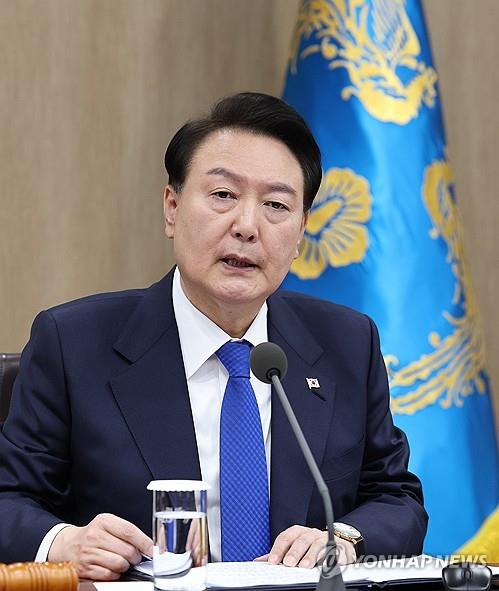- California Assembly OKs highest minimum wage in nation
- S. Korea unveils first graphic cigarette warnings
- US joins with South Korea, Japan in bid to deter North Korea
- LPGA golfer Chun In-gee finally back in action
- S. Korea won’t be top seed in final World Cup qualification round
- US men’s soccer misses 2nd straight Olympics
- US back on track in qualifying with 4-0 win over Guatemala
- High-intensity workout injuries spawn cottage industry
- CDC expands range of Zika mosquitoes into parts of Northeast
- Who knew? ‘The Walking Dead’ is helping families connect
Yoon vetoes pro-labor ‘yellow envelope bill,’ broadcasting law revisions
President Yoon Suk Yeol on Friday vetoed a pro-labor bill and three other contentious measures unilaterally passed by opposition parties last month.
Endorsing a Cabinet motion approved earlier in the day, Yoon requested the National Assembly reconsider the bills, including the “yellow envelope law” aimed at limiting companies from making claims for damages against legitimate labor union disputes.
The labor bill, passed through the opposition-controlled parliament last month, has faced opposition from business lobbies and the ruling party.
Critics argue that it would make it difficult for employers to file complaints against illegal strikes by their workers and exempt laborers from liability for participating in illegal strikes.
“The bill would make it challenging for companies to seek corresponding responsibility for damages caused by illegal strikes, resulting in the promotion of illegal strikes,” Han said during the meeting.
The controversial bill traces back to 2009, when unionized workers of the carmaker SsangYong Motor Co. staged a high-profile strike to oppose a massive layoff. Five years later, the Supreme Court declared the strike illegal and ordered the workers to pay 4.7 billion won (US$3.6 million) in compensation to the company and the state.
In response, civic activists and citizens have delivered yellow envelopes, each containing 47,000 won in donations, to support the SsangYong workers. This has raised the need to amend the trade union law in favor of striking workers, leading to the revision led by the opposition bloc.
The three other bills are revisions to broadcasting laws aimed at reducing the government’s clout over public broadcasters.
Han expressed concerns that such revisions have a high possibility of endangering the fairness of public broadcasting.
Yoon previously rejected two opposition-led bills — a nursing act aimed at stipulating the roles and responsibilities of nurses and a revision to the Grain Management Act, which required the government’s purchase of surplus rice.

The country’s two largest umbrella unions strongly protested the Cabinet’s decision on the labor bill.
With Friday’s motion, “The Yoon government effectively exposed its position one-sidedly speaking for the interest of conglomerates,” the Korean Confederation of Trade Unions said in a statement, pledging to continue to fight against the administration.
“The government and the ruling party will clearly have to take responsibility for thwarting the revision bill that had narrowly passed the National Assembly at the sacrifice of many workers,” the Federation of Korean Trade Unions said in a separate statement.











